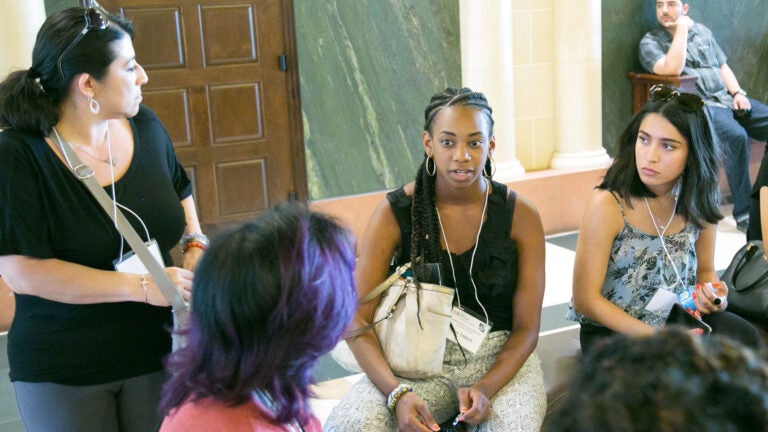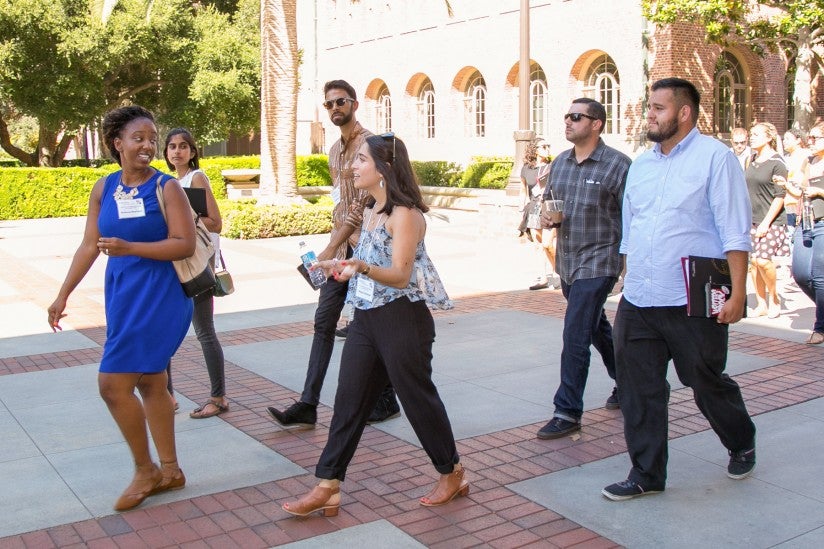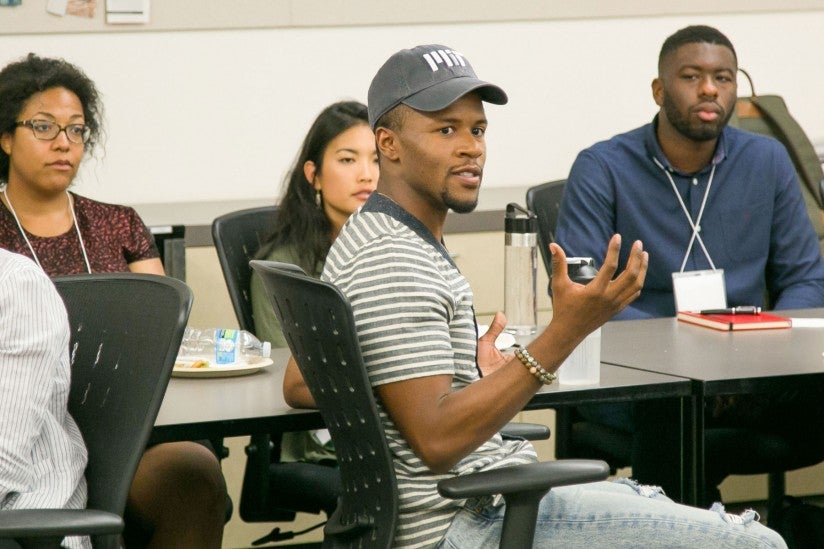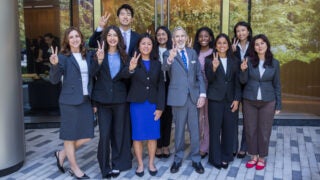
The 2016 Summer Pre-Doctoral Workshop for Students of Color drew a record 30 participants from across the country. (Photo/David Giannamore)
Through PhD diversity program, USC Price hopes to ensure academia is open to ‘all voices’
USC’s Diversity Inclusion Access Initiative is a key part of the university’s commitment to advancing diversity through outreach and research opportunities
At a time when communities across the country are grappling with issues of social injustice and unrest, young people are looking for ways to make a difference. One potential way to contribute to systematic change would be to increase the diversity of scholars.
With that in mind, the USC Price School of Public Policy — in partnership with the Association of Collegiate Schools of Planning — hosted the 2016 Summer Pre-Doctoral Workshop for Students of Color in July. Established in 2013, the three-day workshop encourages students from underrepresented groups to pursue doctoral degrees. USC Price has hosted or co-hosted three of the past four workshops.
“It’s a very gut-wrenching and emotional time in the U.S. right now,” said Professor Marlon Boarnet, chair of the Department of Urban Planning and Spatial Analysis. “This is about making sure academia is open to all kinds of voices so that 20 years from now there are many very strong African-American scholars, Hispanic and Latino scholars, Asian-American scholars, LGBTQ scholars, who are able to speak, who are able to model for their students, who are able to push our institutions.”
University-wide commitment to diversity

Sally Pratt, vice provost for graduate programs, discussed USC’s Diversity Inclusion Access (DIA) Initiative, a major part of the university’s commitment to advancing diversity. Announced last spring, the initiative involves expanding the pool of applicants to PhD programs through outreach efforts and research opportunities; providing funding for selected students who contribute to diversity in USC PhD programs; and offering workshops and events to bolster academic support, professional development and inclusion.
Pratt said USC would waive application fees for attendees of the workshop who decided to apply to a PhD program at the university.
“What you may or may not be conscious of is the degree to which you are role models,” Pratt said. “You are role models for beginning students, for people in your high schools and home communities. You may not even know the people for whom you are role models, but someone somewhere is pointing to you saying, ‘She’s doing this; she went there to school. And I can do that, too.’ ”
Elizabeth Graddy, vice provost for academic and faculty affairs, indicated that currently USC is enrolling a greater number of underrepresented minority students than any other private institution in the Association of American Universities; and among graduate students, USC is bringing in more underrepresented minority students than any AAU university, public or private. She also noted that USC is focusing on diversifying its faculty.
“I know the major challenge the university faces in achieving this goal is the Ph.D pipeline,” said Graddy, who holds the Jeffrey J. Miller Chair in Government, Business, and the Economy at USC Price. “If we fail to attract outstanding students of color to doctoral education, we will not have the qualified minority candidates we need to fill future faculty positions, so I truly want this workshop to be successful.”
Inspiring change through scholarship
Professor Gary Painter, director of social policy at the Price Center for Social Innovation, and Professor Elizabeth Currid-Halkett, participated in a workshop discussion on why students would want to pursue a PhD.
“I think it’s impossible not to address the issues that we face with the world and to think about how you might interact with those issues,” Painter said. “The answer to the question of ‘why do you want to get a PhD’ is so you can become a generator of knowledge that drives change.”
“If you decide a PhD is your path,” he added, “you’re going to develop a tool kit that is going to help you not only in driving change but helping to design and evaluate new systems superior to existing systems.”
Currid-Halkett explained that, for her, life in academia has seemed like an extension of graduate school. She gets up every morning and gets to spend time with very smart people, both her colleagues and her students, from whom she is constantly learning.
“I can probably count on one hand the amount of workdays I have not looked forward to,” she said. “Every day I get up, I’m thinking so what interesting and fun things do I get to do today? That’s something not to be taken lightly because if you look at the stats, not everyone is happy with their job, and I think I can speak for myself and a lot of my colleagues in saying we really are.”
This year, the workshop evolved to include people interested in public policy as well as planning. Attendance grew to a record 30 participants, some currently enrolled in master’s programs, some undergraduates and others recent graduates.
“I came in trying to figure out if a PhD was something I needed to progress in my work,” said Lauro Cons, who has a master’s degree in nonprofit leadership and management from the University of San Diego but aspires to earn a PhD in public policy with an interest in improving the social climates and structures of school systems. “The workshop has really made tangible the aspects of research with the impacts you can make in the community, and I like the idea of working in a broader scope with that kind of impact.”
Shaping lives through research, education

Professor David Sloane and Vice Dean Julie Zissimopoulos, who oversees USC Price’s PhD programs, talked about linking research with action.
Sloane pointed out that it doesn’t always take very long for academics to make an impact. There are doctoral students whose dissertation is used to influence policymaking, advocacy groups and real-world activities.
He called teaching an amazing part of what he does, saying that to think of it as an adjunct to the research is a mistake. Whenever he goes to an academic conference, he runs into former students who are making him proud.
“You’re not just transmitting knowledge to the world, but you’re transmitting knowledge to the next generation,” Sloane said.
Zissimopoulos pointed out that, for academic researchers, a vital skill to develop is being able to engage a “wide variety of audiences” and stakeholders.
“You have to learn to be able to distill your research into a story that has some lessons to be learned from it,” she said.



